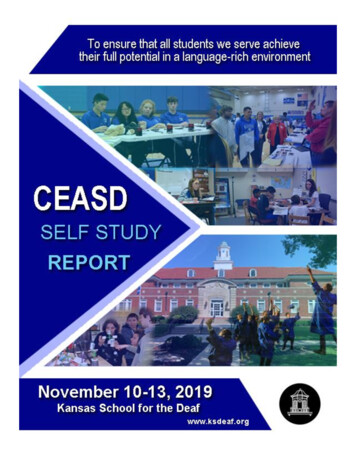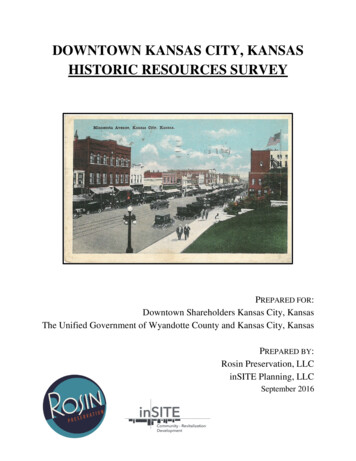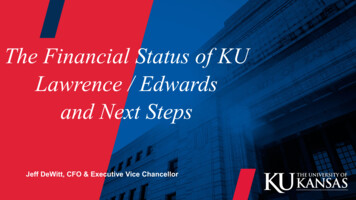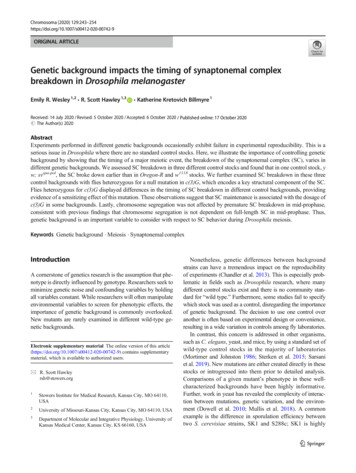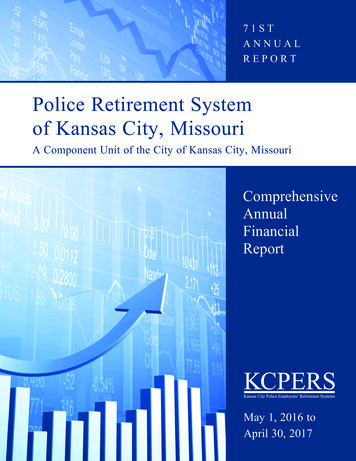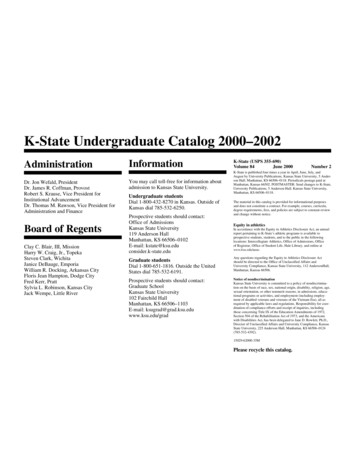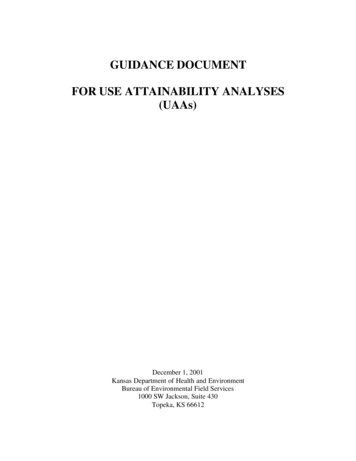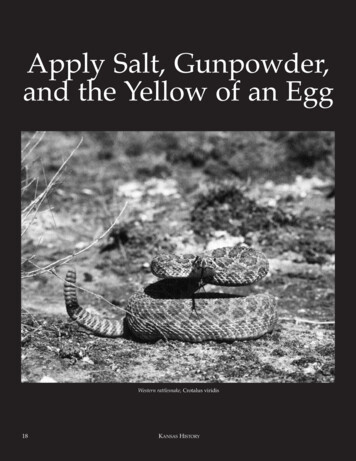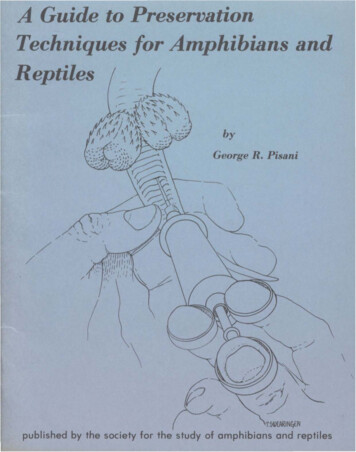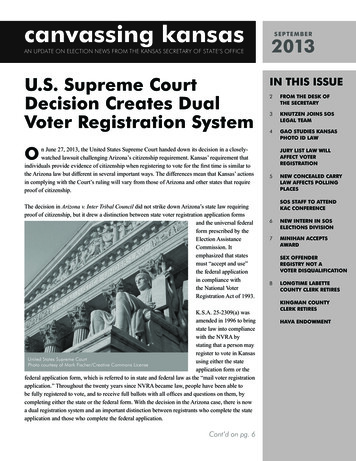
Transcription
canvassing kansasAN UPDATE ON ELECTION NEWS FROM THE KANSAS SECRETARY OF STATE’S OFFICEU.S. Supreme CourtDecision Creates DualVoter Registration SystemSEPTEMBER2013IN THIS ISSUE2FROM THE DESK OFTHE SECRETARY3KNUTZEN JOINS SOSLEGAL TEAM4GAO STUDIES KANSASPHOTO ID LAWOn June 27, 2013, the United States Supreme Court handed down its decision in a closelywatched lawsuit challenging Arizona’s citizenship requirement. Kansas’ requirement thatindividuals provide evidence of citizenship when registering to vote for the first time is similar tothe Arizona law but different in several important ways. The differences mean that Kansas’ actionsin complying with the Court’s ruling will vary from those of Arizona and other states that requireproof of citizenship.The decision in Arizona v. Inter Tribal Council did not strike down Arizona’s state law requiringproof of citizenship, but it drew a distinction between state voter registration application formsand the universal federalform prescribed by theElection AssistanceCommission. Itemphasized that statesmust “accept and use”the federal applicationin compliance withthe National VoterRegistration Act of 1993.K.S.A. 25-2309(a) wasamended in 1996 to bringstate law into compliancewith the NVRA bystating that a person mayregister to vote in KansasUnited States Supreme Courtusing either the statePhoto courtesy of Mark Fischer/Creative Commons Licenseapplication form or thefederal application form, which is referred to in state and federal law as the “mail voter registrationapplication.” Throughout the twenty years since NVRA became law, people have been able tobe fully registered to vote, and to receive full ballots with all offices and questions on them, bycompleting either the state or the federal form. With the decision in the Arizona case, there is nowa dual registration system and an important distinction between registrants who complete the stateapplication and those who complete the federal application.Cont’d on pg. 6JURY LIST LAW WILLAFFECT VOTERREGISTRATION5NEW CONCEALED CARRYLAW AFFECTS POLLINGPLACESSOS STAFF TO ATTENDKAC CONFERENCE6NEW INTERN IN SOSELECTIONS DIVISION7MINIHAN ACCEPTSAWARDSEX OFFENDERREGISTRY NOT AVOTER DISQUALIFICATION8LONGTIME LABETTECOUNTY CLERK RETIRESKINGMAN COUNTYCLERK RETIRESHAVA ENDOWMENT
From the desk of the SecretarycanvassingkansasPublished by the OfficeOn August 21, the Kansas and Arizona secretariesof state filed a complaint against the United StatesElection Assistance Commission (EAC). This is the firsttime two states have brought such a court case against thefederal commission.of the Secretary of StateE DI TO RSBrad BryantKay CurtisThe EAC maintains the national mail voter registrationform (the federal form), including information necessaryto enable the appropriate state election official to assess the eligibility of the applicantThe lawsuit seeks to force the EAC to include in the federal form our concrete evidencerequirements to prove, not merely affirm, U.S. citizenship when registering to vote.L AYO U T ANDDE S I GNTodd CaywoodCONTRI BU TO RSKansas first requested an update to its federal form instructions in August 2012, pursuant tothe state’s statutory requirement to submit evidence of U.S. citizenship when registering tovote. The EAC took no action on the matter, Kansas renewed its request in June 2013, andagain the EAC deferred such request.Jameson BecknerBrad BryantBryan CaskeyKay CurtisSuggestions or comments?Please call (785) 368-8095.This publication may beduplicated for informationalpurposes only. No writtenpermission is required withContrary to a commonly held misconception, the Supreme Court in Arizona v. Inter TribalCouncil of Arizona, Inc. did not hold that a state may not require evidence of U.S. citizenshipwhen registering to vote. Rather, the majority held that federal law precludes Arizona fromrequiring a federal form applicant to submit information beyond that required by the formitself. The Supreme Court has spoken with respect to use of the federal form only, and withrespect to federal elections only. Congress possesses no authority to regulate state elections.The majority opinion in the case specifically suggested this lawsuit, saying that a state mayestablish in a reviewing court that a mere oath will not suffice to effectuate its citizenshiprequirement and that the EAC is therefore under a nondiscretionary duty to include aconcrete evidence requirement on the federal form.the exception of articles orinformation attributed to asource other than the KansasSecretary of State. 2013During the period that the lawsuit is pending, and until the EAC changes the Kansas-specificinstructions to the federal form, the miniscule number of voters who use the federal form andfail to provide proof of citizenship will be permitted to vote in federal elections only. Thosewho use the federal form will be able to vote in federal, state and local elections if theysubmit a citizenship document before election day.Kansas Secretary of StateMemorial Hall120 SW 10th Ave.Topeka, KS 66612-1594(785) 296-45642I look forward to working closely with all of Kansas’s 105 county election officials as thislawsuit proceeds.
Knutzen Joins SOS Legal TeamThomas Knutzen, an attorney in Jefferson County, joinedthe SOS office on July 8, 2013 in the legal department.On September 3, 2013, Knutzen was named Deputy AssistantSecretary of State - Legal Affairs by Secretary of State KrisKobach. Knutzen is a partner in a private law practice and hasserved as an Assistant County Attorney in Jefferson County andAssistant District Attorney in Shawnee County. He lives on afarm in rural Jefferson County with his wife Amy and their threechildren, Michael (4), Ailee (2), and Carolyn (8 months).2012. Kriegshauser left for a position in the Kansas SecuritiesCommissioner’s office.Knutzen succeeds two attorneys who had done legal work forthe Elections Division in the years since Secretary Kobachtook office in January 2011. Ryan Kriegshauser came to theoffice with Kobach and served as Deputy Assistant Secretaryof State-Legal Counsel from January 2011 through DecemberTom Knutzen brings to the SOS office experience as aprosecutor and an attorney in private practice. One of his firstbig tasks will be to litigate lawsuits involving photo ID and thecitizenship requirement in the 2011 SAFE Act. After Kriegshauser’s departure, B.J. Harden performed most ofthe elections-related legal work. Harden had been a law clerkin the SOS office under Ryan Kriegshauser while he completedlaw school at Washburn University. In June 2013 Harden left theSOS office to become the Assistant Chief of Staff in the office ofthe Speaker of the Kansas House of Representatives.Secretary Kobach swore in new legal counsel Tom Knutzen as Deputy Assistant Secretary of State, Legal Affairs in his office on September 3.Photo by Todd Caywood3
GAO Studies Kansas Photo ID LawThe United States Government Accountability Office (GAO)selected Kansas and Tennessee to study the implementationand effect of photo ID voting laws, with the possibility ofadding other states to the list. GAO received a request froma congressional committee to study photo ID laws in severalstates, so the agency’s activities have the force of a congressionalinquiry behind them.GAO initiated a conference call on Thursday, July 11, 2013 withSecretary of State Kris Kobach, State Election Director BradBryant, and Public Affairs Director Kay Curtis. The two-hourcall allowed GAO personnel to obtain background informationon Kansas electoral procedures, the photo ID law and SAFEAct in general, procedures used in planning and implementingthe photo ID law, and the effects of the law on voting. A finaldecision was then made that Kansas would be part of the study,and followup questions were sent via email for SOS staff toanswer.The information requested was organized into four categorieswith specific information requests contained in each category:Voter Identification Information on which of the four Native American tribesissue photo IDs and any available information about howmany voters used tribal IDs; Free ID cards issued by the Division of Motor Vehicles forvoting and demographic information on the applicants; State voter IDs issued by the secretary of state’s office; Guidance provided by the secretary of state to countyelection officers; and Training provided to poll workers.Provisional Ballots The number of voters who voted provisional ballots due tolack of photo ID, and the outcome of those ballots.Vote History Data Data on provisional ballots cast, the reasons they wereprovisional, and the disposition of the ballots for 2008, 2010and 2012; and Data fields contained in the Kansas state voter registrationdatabase.Voter Fraud Spreadsheet of known instances of election crimes; A list of Kansas statutes encompassing election fraud; and Information provided to local officials for prosecution ofelection crimes.Also, GAO requested information about any laws passed from2008 to 2012 that could have a positive or negative impacton voter turnout. Examples in Kansas include: mobile pollingat nursing homes, county option for satellite advance voting,Military and Overseas Voter Empowerment (MOVE) Actamendments to the federal UOCAVA law, redistricting in 2012,and the citizenship requirement of SAFE.The secretary of state’s office responded to the GAO’s requestsin late August and early September. As of this writing, it is notknown how the results will be used or if there will be morefollowup questions. It is expected that the results of the multistate study will be published in a report to Congress. Jury List Law Will Affect Voter RegistrationDuring the 2013 legislative session, HB 2164, concerningjuries, was passed and signed into law by GovernorSam Brownback. This bill, as it relates to elections, requiresjury commissioners to submit to the secretary of state anyinformation concerning prospective jurors who are not qualifiedbecause the prospective juror is not a United States citizen.The information is limited to full name, address, age, telephonenumber and date of birth. The secretary of state’s office will4work with each county when this information is received fromjury commissioners. Because non-US citizens are not qualified tovote, CEOs will be instructed to search voter registration recordsand to cancel the registrations of any persons who are deemedunqualified for lack of citizenship. Look for more information onthis new program later this fall.
New Concealed Carry Law AffectsPolling PlacesIn its 2013 legislative session, the Kansas Legislature passedSenate Substitute for House Bill 2052, also known as thePersonal and Family Protection Act (2013 Session Laws,Chapter 105). The essence of the bill is that persons withconcealed carry handgun permits may carry handguns intopublic buildings except under certain defined circumstances.The law applies to municipal buildings, including any buildingowned or leased by a public entity. If county election officershave polling places in city or county buildings or other publiclyowned buildings, they will most likely come under the law.The law exempts unified school districts. Also, if the countypays rent to use a facility for election day, that facility will besubject to the law.Any facility that is covered by the law must be equipped withadequate security measures to prevent the carrying of weaponsinto the building, or it must allow concealed weapons to becarried into the building, which means removing or covering anysignage that prohibits the carrying of concealed weapons.“Adequate security measures” means electronic metal detectionequipment and personnel with electronic metal detection wands.County election officers must consider some questions: Which voting situations are covered by the law? Does itinclude advance voting sites? Is a facility subject to the law if money is paid for rent? Is a facility subject to the law if it is used by verbal orwritten agreement but no money is paid? If only one room in a building is used for voting, is theentire building subject to the law?Many public entities are trying to figure out exactly what thelaw means. The Kansas Attorney General’s office has receivedmultiple requests for official opinions. The secretary of state’soffice is engaged in discussions with the attorney general’soffice to determine if the questions pertaining to voting will beanswered by the existing opinion requests or if another requestfor an opinion needs to be made. SOS Staff to AttendKAC ConferenceThe Kansas Association of Counties will host its 38th annualfall conference from October 29 through 31, 2013, at theWichita Hyatt Regency Hotel. The theme of the conference is“On Point. Focused and Strategic.Counties Move Forward.”Affiliate groups will conduct their breakout sessions onWednesday, October 30. The county clerks’ session is scheduledfor 1:00 to 4:00 p.m. that day. Members of the secretary ofstate’s office plan to be in attendance to provide updateson litigation involving the requirement to provide proof ofcitizenship when registering to vote, the dual registration systemresulting from use of the federal and state voter registrationforms, legislation for 2014, and plans for the 2014 election cycle.The Personal and Family Protection Act allows a person with aconcealed carry permit to carry a handgun into public buildings.Illustration by Todd CaywoodThe KAC conference is a great way to stay up to date on currentissues and to maintain contacts with colleagues across the state.We encourage county election officers to attend. 5
U.S. Supreme Court DecisionCont’dFederal voting laws such as the NVRA technically apply onlyto federal elections, so the effect of the Court’s decision is thatindividuals who apply for voter registration using the federalform and do not provide proof of citizenship are registered onlyfor federal elections. Those who apply using the state form anddo not provide proof of citizenship are not eligible to vote in anyelections in Kansas. Those who do provide proof of citizenship,whether they applied using the federal or the state form, are fullyregistered and eligible to vote in all elections - federal, state,local and questions submitted.The Supreme Court’s decision outlined a path for states to followin order to have the federal form reflect the state requirementsfor voter registration. States must formally request the ElectionAssistance Commission (EAC) to revise the state-specificvoter instructions included with the application form to notifyapplicants that they must provide proof of citizenship. If theEAC denies the request, the court’s decision said the next stepis to file a lawsuit against the EAC. The commission considersit a policy decision, not a mere ministerial act, to revise the stateinstructions on the federal form in this way. It takes a majorityof the four EAC commissioners to adopt a policy decision, andthere are no commissioners at the EAC. All of the commissionershave left the EAC in the past few years, and no replacements havebeen through the process of being appointed by the President andconfirmed by the U.S. Senate. Therefore, the EAC has denied therequest by deferring action until there is a quorum.In 2012 Kansas had already begun the path laid out by thecourt. Secretary of State Kobach requested in a letter datedAugust 9, 2012, that the EAC revise the voter instructions toinclude a notice to applicants that they must provide proof ofcitizenship to be fully registered to vote in Kansas. The EACdenied the request in a letter dated October 11, 2012, citing thelack of commissioners and the resulting inability to adopt thepolicy. After the court’s decision in the Arizona case, SecretaryKobach renewed his request in a letter to the EAC dated June18, 2013. The EAC again denied the request in a letter datedAugust 2, 2013, once again citing the lack of commissioners.On August 21, 2013, Secretary Kobach jointly filed a lawsuitwith the Arizona Secretary of State against the EAC, calling onthe commission to revise the federal form.While the case is being litigated, Kansas and other similarlysituated states are administering a dual registration system. TheKansas SOS office has issued a directive to county electionofficers to keep track of which applicants use the federal form.6These federal-only registrants will be allowed to vote only forfederal offices in the primary and general elections in 2014(unless they submit a citizenship document before election day).In 2014 the only federal offices on the ballot are U.S. Senateand U.S. House of Representatives. Federal-only voters are notaffected by special question-submitted elections held betweennow and the 2014 elections.Secretary Kobach and staff members convened the SAFECEO Task Force to seek guidance on these issues on August29, 2013. Specifically, the task force was asked to help designthe system for administering the dual registration system designing poll books and ballots, programming changes in theELVIS voter registration database and electronic poll books,and poll worker training. New Intern in SOSElections DivisionThe Elections Division is pleased to announce theappointment of Samantha Poetter (pronounced Potter) as anintern this fall. Samantha is a political science major at KansasState. She succeeds Daniel Lyon, who returned to school toconcentrate on his studies and to serve as a Resident Assistant.Interns in the Elections Division have frequent contacts withcounty election offices via email and phone. Now everyoneknows who they’ll be talking to. Welcome Samantha! New Elections Division intern Samantha Poetter.Photo by Todd Caywood
Minihan AcceptsAwardOn August 22, Secretary of State Kris Kobach presenteda NASS Medallion award to Jim Minihan for his twodecades of service to the Office of the Secretary of State.“Jim Minihan has been instrumental in themost significant accomplishments of theOffice of the Kansas Secretary of State overthe last twenty years,” said Kobach.Among those accomplishments are: building the foundation for the Public Key Infrastructure(PKI tokens) for the state that adds heightened security forstatewide voter registration and electronic notary services; developing and implementing the Kansas statewide voterregistration database (ELVIS); and developing and implementing the voting equipmentprocurement contract that brought Kansas into compliancewith the Help America Vote Act of 2002.The award recognizes outstanding service and dedication tofurthering the mission of the National Association of Secretaries ofState (NASS), including promotion of elections, civic education,service to state government, and commitment to giving. Sex OffenderRegistry Not a VoterDisqualificationUnder Kansas law, a person convicted of a federal or statefelony is disqualified from voting until the full termof the sentence has been served and the person’s rights arerestored. When notified that a person has been convicted, thecounty election officer cancels the person’s voter registration,and the person must re-register when the sentence is complete.There cannot be any parole, probation or other postreleaseterms remaining in the person’s sentence. Not being eligibleto register or vote also means in most cases that the person isineligible to run for office. Relevant statutes are KSA 21-4615and KSA 22-3722.A question has arisen concerning the voting rights of personswho are required to register as offenders - sex, violent ordrug offenders - under the Kansas Offender Registration Act.Research conducted by the secretary of state’s legal staffindicates that the requirement to register as an offender does notdisqualify a person from registering or voting. While Kansascourts have recognized that offender registration has punitiveelements, the courts have generally not considered a mandatedperiod of registration to be part of an offender’s sentence. Someoffenders are required to register for specific periods of time;some are required to register for life.KSA 22-3722 states in part: “When an inmate has reached theend of the postrelease supervision period, the board shall issuea certificate of discharge to the release. Such discharge, andthe discharge of an inmate who has served the inmate’s term ofimprisonment, shall have the effect of restoring all civil rightslost by operation of law upon commitment, and the certificationof discharge shall so state.”Thus, convicted felons who are subject to offender registration,but who have otherwise completed their sentences under KSA22-3722, are eligible to register and vote. Jim Minihan receives a National Association of Secretaries of StateMedallion Award from Secretary Kobach on August 22.Photo by Todd Caywood7
Longtime LabetteCounty Clerk RetiresOn July 1, 2013, Linda Schreppel retired as Labette CountyClerk. Linda had served as county clerk since January14, 1985. (That is over 28 years!) During her time as countyclerk, six different people served as secretary of state. Lindawas instrumental in implementing changes brought about by theNational Voter Registration Act (NVRA), the Help America VoteAct (HAVA), and dozens of other changes in state and federallaw. In addition, Linda witnessed the transformation of a paperbased system to the electronic world we now live in.Peggy Minor was selected as Linda’s replacement. Peggyhas served in the county clerk’s office since August 4, 1986,including serving as deputy clerk since June 1999. Peggy haslived in southeast Kansas her entire life, most of the time inLabette County. She and her husband have three grown childrenand seven grandchildren.Congratulations on a job well done Linda, and welcomeaboard Peggy! Kingman CountyClerk RetiresThis summer, Inge Luntsford retired as Kingman CountyClerk. Inge had been county clerk since December of1996 after taking over for Donna Brown. Inge recently movedto Mayetta, Kansas. She is planning on selling real estate andtaking care of her grandchildren.Carol Noblit was selected as the new county clerk to replaceInge. Carol has been the deputy county clerk since January of1997. Carol is married and has two children, MaryJo, 19 andHunter, 18.Congratulations Carol and Inge! 8HAVA EndowmentThe deadline for placing requests for the 2013/2014 HAVAendowment program arrived August 1st with 45 countiesplacing requests. The Elections Division of the secretary ofstate’s office compiled and evaluated the orders in order tomake a recommendation to Secretary Kobach. The evaluationcriteria include: the amount requested in comparison to thesize of each county’s population, the overall funding available,the nature of the request as a proportion of the whole, and pastendowment history.The largest two categories requested in the HAVA endowmentthis year were voting equipment and electronic poll books.Endowment requests may be approved or denied in full or inpart. Elections Division staff have completed the analysis of theendowment requests and met with Secretary Kobach.Each county has been notified of the final decision and orderswill be forwarded to the appropriate vendors to begin fulfillment.Each county will be billed directly by the vendor its portion ofthe cost with the vendor billing the secretary of state directly forthe remainder of the bill. The SOS office will not pay a vendoruntil the county has received the product, the product is in goodworking order, and the county has formally accepted the productsor services that have been delivered.
Secretary Kobach swore in new legal counsel Tom Knutzen as Deputy Assistant Secretary of State, Legal Affairs in his office on September 3. Photo by Todd Caywood 2012. Kriegshauser left for a position in the Kansas Securities Commissioner's office. After Kriegshauser's departure, B.J. Harden performed most of the elections-related legal work.
